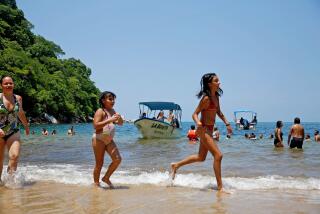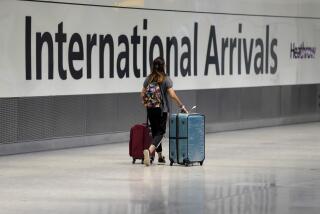Silk Road Smooths Way Into China
- Share via
World Travel Watch is a monthly report designed to help you make informed judgments about travel throughout the world. Because conditions can change overnight, always make your own inquiries before you leave home. In the United States, contact the nearest passport agency office; abroad, check in with the nearest American embassy .
Asia
China/Pakistan: The Kunjerab Pass on the Karakoram Highway at the China/Pakistan border is closed. Although Kashgar, the oasis market town in far west China, has been reopened to tourists, the only way in at this time is the long way around--through China on the Silk Road.
India: Troubled Kashmir remains off-limits to travelers, but the governments of India and Pakistan have agreed to hold high-level talks soon to try to work out a solution in the contested region.
Nepal: Katmandu is essentially peaceful now, with curfews ended, but expect the occasional disruption of services by workers’ strikes, a new phenomenon that has come with the hard-earned democracy. Trekking agencies are planning for a good autumn season.
Sri Lanka: After nine months of relative peace, increased foreign investment and renewed tourism, violence has returned on a disturbing scale with Tamil guerrillas in the north and east abandoning a year-old cease-fire and attacking police installations. Several massacres by Tamil guerrillas have been reported in outlying villages. With tough talk coming from military leaders about showing the insurgents no mercy, it appears the spiral of violence will continue. Exercise caution and avoid traveling to areas in and around Jaffna, Trincomalee and Batticaloa.
Africa
Algeria: Islamic fundamentalists swept recent elections in this heretofore secular North African country. What this means for travelers is uncertain, though alcohol proscription and a conservative Islamic dress code for women (and its attendant effect on female travelers) may be ahead.
Gabon: Unnecessary travel to Port Gentil should be avoided due to recent civil unrest and demonstrations. Check with the U.S. Embassy in Libreville for updated information, and register with the U.S. Embassy on arrival in Gabon.
Liberia: Although the civil war has quieted and peace talks are under way, the country remains volatile. Avoid travel here at this time.
Europe/Soviet Union
France/Germany/the Netherlands/Belgium/Luxembourg: By early 1992, these countries hope to abolish border checks, months in advance of the 12-nation European Community’s deadline of Jan. 1, 1993, to remove internal border controls. Known as the Schengen Accord for the Luxembourg town in which it was signed June 19, the agreement (when it is ratified by the five countries) should speed cross-border traffic and give the EEC some experience in border integration.
Romania: Unrest continues and the potential for violence remains, especially in Bucharest. Exercise caution, and avoid any demonstrations or large gatherings of people.
Soviet Union: In major cities such as Moscow and Leningrad, the dollar is king. Expect to pay for taxis and restaurant and hotel services with greenbacks, not rubles. Bring along a good supply of $1, $5 and $10 bills.
Caribbean/Central America
Dominican Republic: The dollar goes a long way here, but be careful with tortoise-shell products. Many tortoise species are endangered and importation of such goods to the United States is prohibited. These items could be seized by U. S. Customs and their bearers subject to fines. It’s best to avoid buying any animal products.
Nicaragua: Now that the eight-year civil war has ended, hopes are high that the troubled country can move ahead into a new era of peace and prosperity. Visitors must exchange $60 U.S. into cordobas at the port of entry. Major hotels in Managua, and some smaller hotels and hostels, charge foreigners in U. S. currency and won’t accept traveler’s checks, so make sure you take enough cash to cover expenses. Credit cards are infrequently accepted. Travel from Honduras to Nicaragua should be done only by air because of border security problems, including minefields, particularly along the Rio Coco and Atlantic Coast region.
Southeast Asia
Cambodia: The Khmer Rouge has agreed to proposals for putting the 12th-Century ruins of Angkor Wat under U.N. management as a demilitarized zone.
For more information on safety concerns in countries you may be visiting, contact the Citizens Emergency Center, U.S. Department of State, Washington, D.C. 20520, (202) 647-5225 .
More to Read
Sign up for The Wild
We’ll help you find the best places to hike, bike and run, as well as the perfect silent spots for meditation and yoga.
You may occasionally receive promotional content from the Los Angeles Times.






